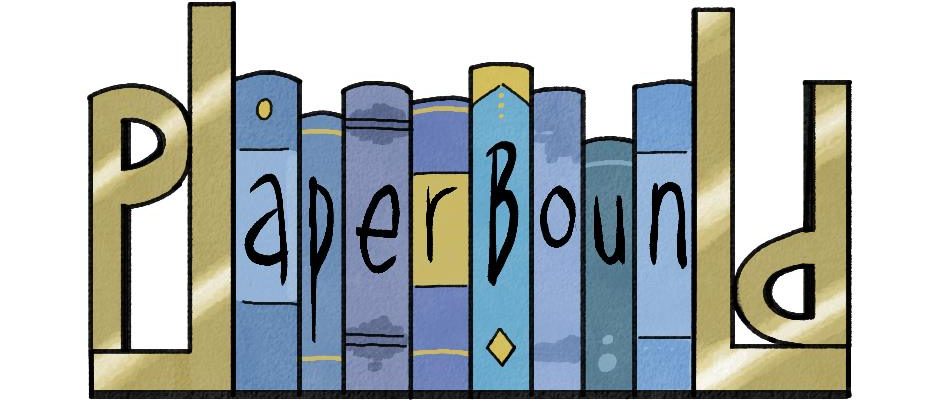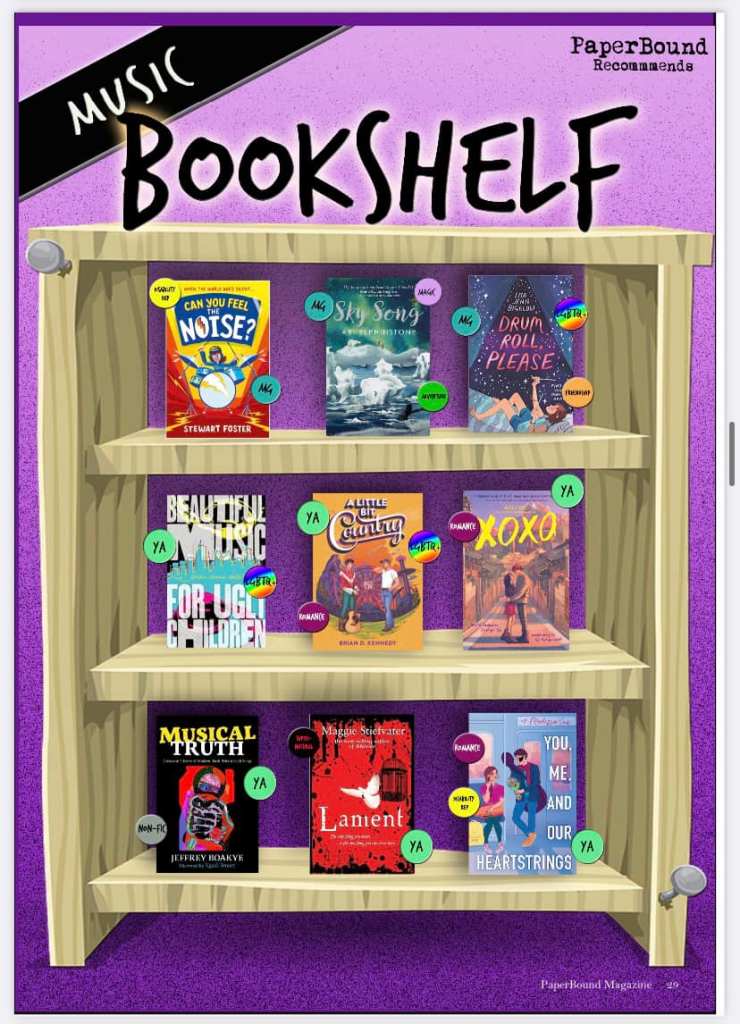Each issue, we choose a winning entry from all the submissions sent to us. For the winter issue of PaperBound Magazine 2022, our winning entry is the short story ‘The Music of the Vale’ by Steve Blackman. Keep reading below to find out more.

The Music of the Vale
By Steve Blackman
For as long as anyone can remember, we’ve lived on the floor of the vale. Our village here is safe, protected – a sprawl of houses and schools and shops that line one bank of the crashing river.
On the other side, facing us, is another village, a mirror of ours. The people who live there go about their lives a stone’s throw away from us, but we’ve never met. No bridge has ever been built, and entering the torrent that separates us would mean certain death.
Over the years, many have searched for ways to cross the river, following its course in both directions. None met with success, even those who travelled for many weeks, though they returned with stories of forests, and meadows filled with exotic flowers, and wild deer and bobcats. Most people stay close to the village. Even the farmers on the furthest outskirts of our communities are only a day away, close enough that sometimes – if the wind’s in the right direction – we can smell the cows and pigs and sheep in their pens.
The farmers and the shepherds are here tonight though, the one night every year when they leave their crops and their animals to join the residents of both villages, lining the steep sides of the vale. Some have used ladders and ropes to climb as high as they can – finding the uppermost rocks and outcrops before the canyon walls become smooth and unclimbable. From where my fellow villagers sit, it’s impossible to see the faces of those far away on the opposite side, only shapes, lit by the flickering of torches held aloft or wedged into fissures. Not that they’re looking at one another – all eyes are focused down on the open spaces that mark the eastern end of our communities.
That’s where I am now, near the bank of the river, me and eleven other cantors and musicians from my village. After fifteen years of watching this ceremony from the side, it’s finally our turn. We’re facing another group of twelve across the noise and the spray. I recognise the girl at the front of their troupe. I see her sometimes, going to school or running errands. She’s just like me: same age, same clothes, same life. Except she’s there and I’m here. Still, I feel connected to her somehow, like I know her. Normally, if nobody’s around, we might even wave. But there’s no waving tonight. We’re here to fight for our lives.
I’ve rehearsed with my troupe all year, but my mum’s been preparing me since I was a baby, when she taught me how to understand the sounds around me. I could identify birds from their songs by the time I was five; could predict a change in the weather from the movement of the wind over the rock walls surrounding us. It was her who showed me how to seek the right music; how to know it when I heard it.
Tonight I won’t live or die because of how beautifully I sing, but how well I listen.
The hum of the crowd fades as the leader of each village steps onto their podium. Both Alderwomen wear their cloaks of office: ours is thick with black raven feathers that shine in silky highlights of turquoise and purple; theirs is a dazzling white, the soft fur of wolf hides rippling in the breeze. As last year’s winners, it’s the other side that begins the ceremony. Sure enough, their Alderwoman lifts the ceremonial mallet above her head, and the silence around us deepens. She stands like that for what feels like an eternity, and when she finally strikes the bell, its ring fills the night. As tradition dictates, our performances must begin before it fades.
There’s a chill in the air, but I’m sweating. My heart is racing and my nerves are stretched so tight they might snap. Breathe, says my mum’s voice in my head. Listen. I wipe my palms on my skirt, and slow my breathing until I find a place of stillness within; until the raging water offers me the tone I need.
Gently at first, I begin to sing, harmonising with the music of the river. Next to me, Silas follows – a baritone murmur that echoes the distant rumbling of the night sky. From the opposite bank comes the high keening of a wooden flute, like a fledgling osprey calling for its mother. A minute later, my best friend Beth wakes her marimba with the hollow echoes of the earth below our feet. One by one, the others around me respond to the music they hear in the world.
Before long, around half the performers on both sides have found their own sounds, and already the pull is there – a tug that begins in my guts, compelling me forward. It becomes more insistent every time another voice joins in, calling me, like a siren song, but I clench my fists and stand firm. Beth misses a note, and I know she, too, is resisting the urge to step forward. Soon, someone will lose that fight, and will be pulled into the torrent, and lost forever.
Above us all, the night sky is strewn with so many stars it’s hard to see the blackness between them. A pair of shadows float across it, only visible as they blot out the stars above them, and the high mewling call of a female nighthawk floats down. In response, the final member of our troupe begins to sing. Eloise’s voice is haunting, ethereal, filled with pain and hope and love. My eyes fill with tears as she completes our number and we become one.
Our song is the world, the land we walk on, the air we breathe. It’s part of the night, filling the vale, impossible to resist.
There’s a cry from someone in the troupe opposite, and their song falters. It’s the opening we need, and we focus our performances on that weakness. But their cantors are strong, and they come together, building their defence. It continues like that, each troupe searching for an opportunity to strike, our songs intertwining, clashing, flowing from one side to the other.
On the edge of my vision there’s movement. Silas has taken a shuffling step forward. I reach out to grasp his hand and our fingers intertwine. But he takes another step, longer this time. My pulse thrums in my neck and in my fingertips. It’s in Silas’s hand too, like we’re sharing a single heartbeat. I grip his fingers as hard as I can, so his nails cut into my skin, but it’s not enough, and his hand is slowly pulled from mine as he edges forward.
Lifting my head, I sing to the sky, driven by the rhythm of the blood flowing through me, and one by one, more shadows mask the stars. Eloise sings to them, and the nighthawks call back, dipping and swirling with our voices. Silas is making sounds I’ve never heard before, so deep they seem solid – like I could grasp them. I close my eyes, and listen harder than I’ve ever listened in my life, and slowly, faintly, it reaches me. Below the constant booming of the water is something else, the rasp of the torrent against its banks, the chattering of the stones racing along the river bed. Those sounds become part of my song, or I become part of them, and I yield to them: irresistible, elemental.
For the first time since we gathered, another voice cuts through the performances – the single cry of a mother, calling No! I open my eyes, and my guts cramp like someone’s reached in and squeezed them. The girl opposite me is moving. Her eyes are locked on mine, and she’s smiling, but tears are flowing down her cheeks. And still she’s singing. Her body shakes as she tries to resist, but our call is too strong, too pure, and inch by inch, it pulls her onwards.
I have no choice but to focus my voice on her – we all do – and our performance is so powerful, the air between us seems to bend and shimmer. It pulls her to the edge of the steep riverbank. One more step and she’ll be lost, but she plants her feet in a last effort to defy our music. Her eyes are squeezed shut now, and she’s shaking her head, and it’s so much effort to stand firm, she gasps, breaking her song. As she does, I change my pitch – an octave higher – and it’s like I’ve pushed a door, opening the way in. The voices around me swirl across the river, wrapping around the girl like a net. She cries out in pain, a high, piercing note, and takes the final step.
When the river swallows her, her voice hangs in the air like the chiming of the bell. Eventually it fades, leaving only the calling of the birds, the rushing of the water.

Despite his name, Steve’s neither the showrunner of The Umbrella Academy nor the wrestler, although he’d happily give either a go. He is, however, the inventor of the self-heating soup can, the internet, and sourdough. When he’s not inventing, he writes YA novels with STEM themes. Most of the time, he lives in South London with his wife and their two teenage daughters. He still doesn’t have a Facebook account. You can follow him on Twitter here.
You can read even more music-themed stories, author interviews and more in our latest issue by clicking here. All our issues are completely free and run by volunteers, however if you would like to support PaperBound and the work we do, you can help us out by buying us a virtual book.
Here at PaperBound, we love stories. Want to be a part of ours? Find out more.


